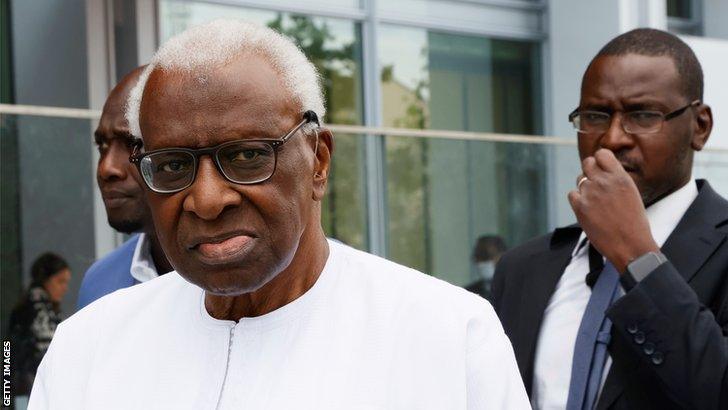Former athletics chief Diack enjoys return to supportive Senegal despite convictions
- Published

Senegal's former World Athletics president Lamine Diack during his corruption trial in France in 2020
Senegal's disgraced former World Athletics president Lamine Diack is a "worthy son of the nation" according to the man who has organised to pay a surety to allow his return home.
Diack, head of athletics' world governing body from 1999 to 2015, returned to Senegal on Monday for the first time since being placed under house arrest in France in November 2015 as he faced trial for corruption.
In September, the 87-year-old was found guilty of corruption and money-laundering charges linked to the Russian doping scandal and sentenced to four years in prison, two of them suspended.
Despite the convictions, he has been allowed to return to Senegal thanks to Cheikh Seck, the owner of Senegalese football club Jaraaf, who paid a 500,00 euro bond that will ensure Diack continues to respond to summonses by French authorities.
Seck also gave his backing to Diack in spite of the guilty verdicts in France.
"We decided during an extraordinary general assembly that we shouldn't have to collect money for Diack, a worthy son of the nation, an all-round remarkable citizen," said Seck, a businessman and former Senegal international goalkeeper.
"[Diack's return to Senegal] was a moment of joy and pride. His time in France lasted for too long and the Jaraaf family is happy with this ending. You can imagine how happy he was, and about his reunion with his daughters."
Diack was convicted of accepting bribes, from athletes suspected of doping, to cover up their test results and let them continue competing, including in the 2012 London Olympics.
Due to his age and health, French justice authorities spared him from spending time in jail.
Athletics faces crisis - IAAF boss Lamine Diack, speaking to BBC Sport's Dan Roan in February 2015
Supportive Senegal
Despite the scandal, Diack has always enjoyed support in Senegal with a group called the 'Collectif Lamine Diack' organising several demonstrations.
Diack's name may have been forever tainted globally by the corruption scandal but he remains well thought of back home.
His career saw him start as the 1958 French long jump champion before moving into sports administration and politics.
"The love Senegalese have showed for Lamine Diack has always been positive and never tainted to the point that one does not call into question either his probity, or what he represents in this country," journalist Harouna Deme told BBC Afrique.
Another local journalist and former president of the Senegalese sports journalist union, Mamadou Koume, is very close to Diack.
"Lamine Diack represents a lot of things for people of my generation but also for the youth," he told BBC Afrique.
"He has been always involved in sport. He was the technical director for the football national team of Senegal in the 60's".